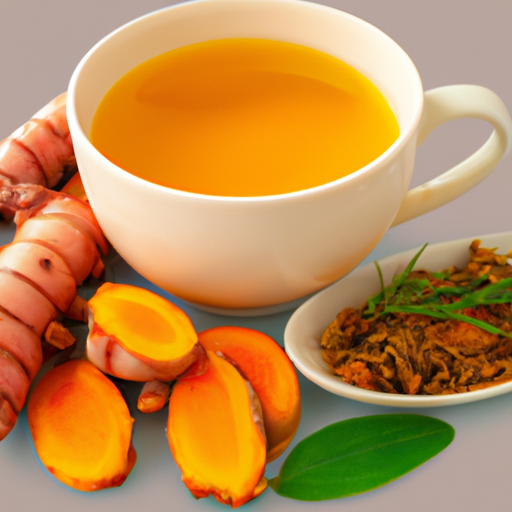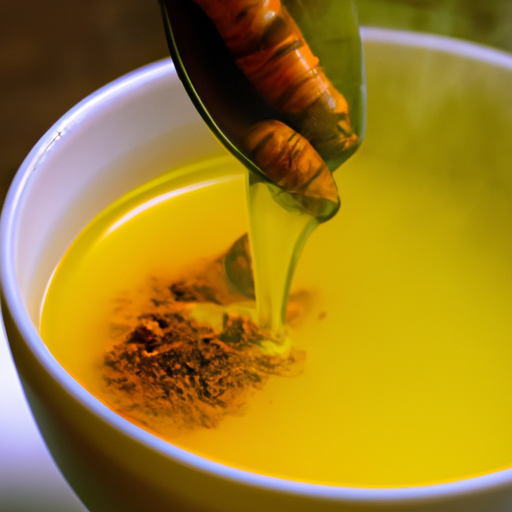So, you’ve heard about the amazing health benefits of turmeric and you’re wondering if you can incorporate it into your daily routine by drinking it like tea.
Well, the good news is that you absolutely can! Turmeric has been used for centuries in traditional medicine for its powerful anti-inflammatory and antioxidant properties. This golden spice, known for its vibrant color and distinct flavor, contains a compound called curcumin, which is responsible for many of its medicinal effects.
By brewing turmeric into a delicious tea, you can enjoy all of its potential health benefits in a warm and comforting way.
In this article, we will explore the various health benefits of turmeric, discuss how to make turmeric tea, and provide tips on incorporating this spice into your diet.
So grab your favorite mug and let’s dive into the world of turmeric tea!
Key Takeaways
- Turmeric can be incorporated into daily routine by drinking it like tea.
- Turmeric tea offers potential health benefits such as reducing inflammation and boosting the immune system.
- Turmeric may cause stomach upset, nausea, or diarrhea in high doses.
- It’s important to consult with a healthcare professional before adding turmeric to your diet, especially if you are taking medications or have any health concerns.
The Health Benefits of Turmeric
Yes, you can absolutely drink turmeric like tea and experience the incredible health benefits it has to offer. Turmeric, a vibrant yellow spice commonly used in Indian cuisine, has gained popularity for its medicinal properties. It contains a compound called curcumin, which has been shown to have anti-inflammatory and antioxidant effects.
There are several ways to enjoy turmeric as a beverage. One option is to make turmeric tea by steeping grated or powdered turmeric in hot water for about 10 minutes. You can enhance the flavor by adding a squeeze of lemon or a dash of honey. Another option is to incorporate turmeric into your daily routine by including it in smoothies or juicing recipes. Additionally, there are turmeric supplements available in the form of capsules or powders, which can be conveniently added to your favorite drinks or recipes.
Turmeric is known for its potential benefits in reducing inflammation, improving digestion, and boosting the immune system. It has been used in traditional medicine for centuries to treat a variety of ailments. Incorporating turmeric into your diet through beverages or supplements can be a simple and practical way to reap its health benefits.
Now, let’s explore turmeric as a herbal tea alternative and its unique properties.
Turmeric as a Herbal Tea Alternative
When it comes to herbal tea alternatives, turmeric is a great option. I personally enjoy brewing turmeric tea by adding boiling water to ground turmeric and letting it steep for a few minutes.
To enhance the flavor, I like to add a pinch of black pepper and a squeeze of lemon.
Not only does turmeric tea taste delicious, but it also offers potential health benefits, such as reducing inflammation and boosting the immune system.
Brewing turmeric tea
Turmeric tea, brewed with a hint of ginger and a squeeze of lemon, is a soothing and healthy beverage. When it comes to brewing turmeric tea, there are a few techniques to keep in mind.
First, start by boiling water in a pot and add a teaspoon of ground turmeric. Let it simmer for about 10 minutes, allowing the flavors to infuse. If you prefer a stronger taste, you can increase the amount of turmeric.
As for the recommended dosage, it’s generally safe to consume up to 1-2 cups of turmeric tea per day. However, it’s always a good idea to consult with a healthcare professional, especially if you have any underlying health conditions.
Adding other ingredients like black pepper or cinnamon can further enhance the flavor and provide additional health benefits.
Adding other ingredients for flavor
To spice up your turmeric concoction, try sprinkling in a pinch of black pepper or a dash of cinnamon for an extra burst of flavor. These additions not only enhance the taste of your turmeric tea but also offer additional health benefits.
Black pepper contains a compound called piperine, which has been shown to enhance the absorption of curcumin, the active compound in turmeric. This means that adding black pepper to your turmeric drink can increase its effectiveness.
Cinnamon, on the other hand, not only adds a pleasant, warm flavor but also has its own anti-inflammatory and antioxidant properties. So, by incorporating these ingredients into your flavored turmeric drinks, you can enjoy a delicious and nutritious beverage.
Moving on to the potential health benefits of turmeric tea, let’s explore how this golden spice can improve your well-being.
Potential health benefits of turmeric tea
Enhance your well-being by incorporating turmeric tea into your daily routine and experience the potential health benefits it offers. Turmeric is known for its active compound, curcumin, which has been studied for its anti-inflammatory and antioxidant properties.
Drinking turmeric tea may help reduce inflammation, improve digestion, and boost your immune system. However, it’s important to be aware of potential side effects and the recommended dosage. High doses of turmeric may cause stomach upset, nausea, or diarrhea.
It’s generally safe to consume up to 1-2 teaspoons of turmeric powder per day, but it’s always best to consult with a healthcare professional for personalized advice.
In the next section, we’ll explore the risks and considerations associated with drinking turmeric tea.
Risks and Considerations
Before incorporating turmeric into your daily routine, it’s crucial to be aware of the potential risks and considerations involved. While turmeric is generally safe for consumption, excessive intake can lead to certain health risks.
Consuming large amounts of turmeric over a long period of time may cause stomach upset, nausea, and diarrhea. It may also interact with certain medications, such as blood thinners, diabetes medications, and stomach acid-reducing drugs. Therefore, it’s important to consult with a healthcare professional before adding turmeric to your diet, especially if you’re taking any medications.
Additionally, turmeric has a natural yellow pigment called curcumin, which can stain teeth and fabrics. To minimize the risk of staining, it’s recommended to consume turmeric tea in moderation and rinse your mouth with water afterwards. If you experience any adverse effects or allergic reactions, such as itching, swelling, or difficulty breathing, discontinue use and seek medical attention.
In the next section, we’ll explore different ways of incorporating turmeric into your diet, allowing you to enjoy its potential health benefits while minimizing any potential risks or considerations.
Incorporating Turmeric into Your Diet
One way you can easily add turmeric to your diet is by sprinkling it on your favorite savory dishes, such as roasted vegetables or scrambled eggs – studies have shown that consuming turmeric with black pepper increases its absorption by up to 2,000%!
Here are four ways you can incorporate turmeric into your diet:
-
Turmeric recipes: There are countless recipes that feature turmeric as a key ingredient. You can try making a delicious turmeric latte, golden milk, or a flavorful curry. These recipes not only provide a tasty way to consume turmeric but also offer a variety of health benefits.
-
Turmeric pills: If you prefer a more convenient option, you can take turmeric in the form of pills or supplements. Turmeric pills are a popular choice for those looking to enjoy the benefits of turmeric without the hassle of cooking or adding it to meals. However, it’s important to consult with a healthcare professional before starting any new supplement regimen.
-
Turmeric smoothies: Another great way to incorporate turmeric into your diet is by adding it to your daily smoothies. Blend turmeric with fruits, vegetables, and your choice of liquid to create a refreshing and nutritious drink. This is a convenient option for those who are always on the go.
-
Turmeric-infused oils: You can infuse turmeric into cooking oils like olive oil or coconut oil to add a subtle flavor and reap the benefits of turmeric in your everyday cooking. Use the infused oil to sauté vegetables, drizzle over salads, or as a marinade for meats.
By incorporating turmeric into your diet through various methods, you can enjoy its numerous health benefits. In the next section, we will explore other ways to enjoy turmeric and enhance your overall wellness.
Other Ways to Enjoy Turmeric
If you’re feeling adventurous, try incorporating turmeric into your homemade salad dressings for a vibrant and flavorful twist. Turmeric adds a beautiful golden color and a slightly earthy taste to dressings, making them both visually appealing and delicious. To make a simple turmeric dressing, mix together olive oil, lemon juice, turmeric powder, and a pinch of salt. Drizzle it over your favorite greens and enjoy the unique flavor combination.
In addition to salad dressings, there are many other ways to enjoy turmeric in your diet. You can use it as a spice to season roasted vegetables, add it to soups and stews for an extra kick, or even make turmeric-infused rice or quinoa. The possibilities are endless when it comes to incorporating turmeric into your meals.
If you prefer a quick and convenient option, you can also consider turmeric supplements. These supplements contain concentrated amounts of curcumin, the active compound in turmeric, and can provide potential health benefits. However, it’s important to consult with a healthcare professional before starting any new supplements.
Now that we’ve explored the various ways to enjoy turmeric, let’s move on to frequently asked questions about turmeric and its potential benefits.
Frequently Asked Questions about Turmeric
Curious about turmeric? Let’s dive into some frequently asked questions to learn more about its potential benefits.
One common question is whether turmeric can aid in weight loss. While there’s some evidence to suggest that turmeric may help with weight management, it isn’t a magic solution for shedding pounds. Turmeric contains a compound called curcumin, which has been shown to have anti-inflammatory properties. Inflammation can contribute to weight gain, so reducing inflammation with turmeric may indirectly support weight loss efforts. However, it’s important to note that turmeric alone isn’t enough to achieve significant weight loss.
Another frequently asked question is whether turmeric can help with inflammation. Again, the curcumin in turmeric has been shown to have anti-inflammatory effects. Inflammation is a natural response in the body, but chronic inflammation can contribute to various health conditions. Incorporating turmeric into your diet may help reduce inflammation and potentially alleviate symptoms of conditions such as arthritis or inflammatory bowel disease. However, it’s important to consult with a healthcare professional before using turmeric as a treatment for any specific condition.
While turmeric has been associated with potential benefits such as weight management and reduced inflammation, it isn’t a magical cure-all. Incorporating turmeric into your diet, whether through drinking it as a tea or adding it to meals, can be a flavorful and healthy addition. However, it’s important to remember that individual results may vary and that turmeric shouldn’t replace other healthy lifestyle habits.
Conclusion: Is Drinking Turmeric Like Tea Worth It?
In evaluating the benefits and risks of drinking turmeric like tea, it’s important to consider the potential health benefits, such as its anti-inflammatory properties and potential for improving digestion. However, it’s also crucial to be aware of potential risks, such as allergic reactions or interactions with certain medications. Personal preferences and taste preferences should also be taken into account, as not everyone may enjoy the taste of turmeric in tea. Consulting with a healthcare professional can provide personalized guidance and ensure that drinking turmeric like tea is a safe and suitable option for you.
Evaluating the benefits and risks
You can enjoy the benefits of drinking turmeric like tea, but it’s important to be aware that consuming excessive amounts may lead to an increased risk of kidney stones. Turmeric tea recipes are a popular way to incorporate this spice into your daily routine, as it is believed to have anti-inflammatory and antioxidant properties. However, it’s also important to be mindful of potential side effects. Some people may experience digestive issues, such as an upset stomach or diarrhea, when consuming large amounts of turmeric. Additionally, turmeric can interact with certain medications, so it’s always best to consult with a healthcare professional before adding it to your diet. To help you understand the benefits and risks, here is a table summarizing the evidence-based information:
| Benefits | Risks |
|---|---|
| Anti-inflammatory | Increased risk of kidney stones |
| Antioxidant | Digestive issues |
| Interactions with medications |
Considering personal preferences and taste preferences, it’s important to find a balance that works for you.
Personal preferences and taste preferences
When it comes to drinking turmeric like tea, personal preferences and taste preferences play a crucial role. Some people enjoy the earthy and slightly bitter taste of turmeric, while others may find it too strong or overpowering.
Fortunately, there are various ways to make turmeric tea more palatable. Adding honey, lemon, or ginger can help balance the flavors and enhance the taste. Additionally, using milk or plant-based milk alternatives can create a creamier and milder beverage.
It’s important to note that while taste preferences are subjective, the health benefits of turmeric are well-documented. Turmeric contains a compound called curcumin, which has anti-inflammatory and antioxidant properties. These properties may help support a healthy immune system and reduce the risk of chronic diseases.
However, before incorporating turmeric tea into your routine, it’s always a good idea to consult with a healthcare professional for personalized advice and guidance.
Consulting with a healthcare professional
Before incorporating turmeric into your routine, it’s advisable to seek guidance from a healthcare professional who can provide personalized advice based on your specific needs and concerns. Consulting with a healthcare professional is important because they can help you determine the appropriate dosage of turmeric for you.
They can also assess any potential interactions with medications you may be taking. Additionally, a healthcare professional can guide you on the best way to consume turmeric, whether it’s in the form of tea or through other methods. They can provide insights on the potential benefits and risks associated with turmeric consumption, helping you make an informed decision.
By consulting with a healthcare professional, you can ensure that you are using turmeric in a safe and effective manner, tailored to your individual health needs.
Frequently Asked Questions
Can drinking turmeric tea help with weight loss?
Drinking turmeric tea can potentially aid weight loss by boosting metabolism and reducing inflammation. Its benefits include improved digestion, antioxidant properties, and potential appetite suppression. Try various turmeric tea recipes for optimal results.
How much turmeric tea should I drink in a day?
I should drink about 1-2 cups of turmeric tea per day to reap its benefits. Turmeric tea is known for its anti-inflammatory properties and can be made using various recipes like golden milk or ginger turmeric tea.
Does turmeric tea have any side effects?
Turmeric tea has many benefits, including reducing inflammation and boosting immunity. However, excessive consumption may lead to side effects such as an upset stomach or allergic reactions. It’s important to follow turmeric tea recipes and consume it in moderation.
Can turmeric tea help with reducing inflammation?
Yes, turmeric tea can help reduce inflammation. It contains curcumin, a compound known for its anti-inflammatory properties. To make it, simply steep turmeric powder or grated root in hot water for 10 minutes.
Is it safe to consume turmeric tea during pregnancy?
Is it safe to drink turmeric tea during pregnancy? While turmeric tea has many benefits, it is recommended to consult with a healthcare professional before consuming it during pregnancy or breastfeeding.
Conclusion
After researching the topic extensively, I’ve come to the conclusion that drinking turmeric like tea is indeed worth it. The health benefits of turmeric, such as its anti-inflammatory and antioxidant properties, make it a valuable addition to any diet.
While more research is needed to fully understand its effects, incorporating turmeric into your daily routine can potentially improve your overall well-being. So go ahead and enjoy a warm cup of turmeric tea, knowing that you’re giving your body a boost of goodness.










